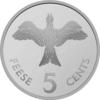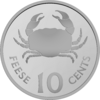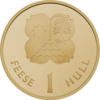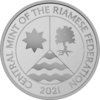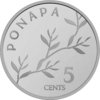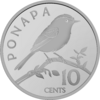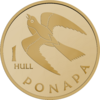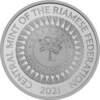Riamese hull
| hull (Norwegian) | |
|---|---|
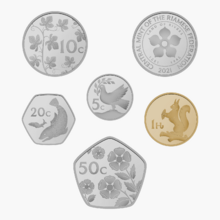 Coins of the Riamese hull | |
| ISO 4217 | |
| Unit | |
| Plural | no plural |
| Symbol | Ƕ |
| Denominations | |
| Subunit | |
| 1⁄100 | cent |
| Plural | |
| cent | cents |
| Banknotes | |
| Freq. used | 5Ƕ, 10Ƕ, 20Ƕ, 50Ƕ |
| Rarely used | 100Ƕ |
| Coins | 5c, 10c, 20c, 50c, 1Ƕ |
| Demographics | |
| Date of introduction | 1837 |
| Replaced | Riamese pent |
| User(s) | see Countries and Territories below |
| Issuance | |
| Central bank | Federal Monetary Authority |
| Website | ma.fed.govt.rm |
| Printer | Federal Government Printing Service |
| Website | print.govt.rm |
| Mint | Central Mint of the Riamese Federation |
| Website | mint.govt.rm |
| Valuation | |
| Inflation | 4.1% (April 2022) |
The hull ([hʊl], abbreviation: hl (rarley used); code: RMH), plural hull, is the currency of the Riamese Federation (including its overseas territories and countries). It is divided into 100 cents.
The hull was introduced as part of sweeping currency reforms in the eighteenth century. Due to rapid inflation, the Riamese pent was abolished and replaced with the new hull at a rate of 1 hull to 5 pent. The pent had suffered significant inflation from the 1820s as part of a broader economic and financial crisis.
The hull is also known as the Riamese Federal Hull to distinguish it from the local issue of hull in Freice and Pohnpenesia, which are known as Riamese Hull (Overseas). The Federal Currency Area is the overall name for all countries and territories officially using the hull.
History
Second pent (1702-1837)
As part of a series of currency reforms in the late seventeenth and early eighteenth centuries, most of the nation's coinage was redesigned and redenominated. A number of silver coins were reduced in size and weight as the precious metal value decreased. Between 1702 and 1704, a majority of re-denominated coins were counter-stamped with 1704 and 1705 seeing the introduction of new coinage.
Hull (1837-present)
Creation
The Riamese Treasury approved the creation of a new currency in 1834, with the hull formally introduced over a period of three years from 1834-1837. The name "hull" comes from the word "hol," an historic variant of the word "whole." The original nomenclature (e.g., one-one hundredth of a hull, half hull etc. literally mean "[fraction] of the total (whole)").
The first coins introduced were the one tenth of an hul, quarter hull, half hull (1834-1835). These were followed by a one hull coin (1836) and smaller denomination coins in 1837. The pent continued to circulate alongside the hull at a new rate of exchange until pent coins were fully demonetised in 1844. A number of counterstamped pent coins, bearing their value in hull, circulated until they too were demonetised in 1852.
2019 redesign
In November 2018, the Central Mint announced new designs for the definitive set of coinage, which were released in June 2019. The new designs focus on Riamo's natural environment with an emphasis on simple designs and accessibility. The obverse designs follow a common template, bearing a large numeral denomination alongside the relevant design. The large numeral was intended to make it easier for children to learn and for visually-impaired persons to distinguish between denominations.
The reverse bears the same design as before, with a slight update of typeface.
Coins
| Value | Technical parameters | Description | ||||
|---|---|---|---|---|---|---|
| Diameter | Mass | Composition | Edge | Obverse | Reverse | |
| 5 cents | 18 mm | 3.25 g | Aluminium | Plain | Dove with branch, denomination | "Central Mint of the Riamese Federation", national emblem, year of issue |
| 10 cents | 25.9 mm | 7.12 g | Leaves, denomination | |||
| 20 cents | 21.4 mm | 5 g | Salmons, denomination | |||
| 50 cents | 27.3 mm | 8 g | Cupronickel | Roses, denomination | ||
| 1 hull | 23.03 mm | 8.75 g | Bronze | Reeded | Squirrel, denomination | "Central Mint of the Riamese Federation", national emblem, year of issue |
Local issues
Although the hull is legal tender across the Riamese Federation, there are different designs used in the federal countries. These designs are not necessarily widely-circulated, but remain legal tender. In the majority of cases, these issues are commemorative and are not intended for general circulation.
Freice
The Freician-variant of the hull was first introduced in 1998. In 1996, the Government of Freice petitioned the Federal Government for permission to begin production of coins bearing Freician iconography and designs. In 1997, the Freice Coinage Order was issued under authority of the Coinage Act 1972, giving permission for the minting of Freice-variant coins. The first coins were issued in 1998, with designs by Joereni Suivau. These designs are still used today.
| 0.05Ƕ | 0.10Ƕ | 0.20Ƕ |
|---|---|---|
Kaldaic starling
|
Kaldaic
seagulls |
Kaldaic
salmon |
| 0.50Ƕ | 1Ƕ | Reverse side |
Maartilee
|
Emblem of
Freice |
Legend and
Emblem escutcheon |
Pohnpenesia
| 0.05Ƕ | 0.10Ƕ | 0.20Ƕ |
|---|---|---|
Kaldaic water
bush |
Vinal
flower-warbler |
Traditional boat
|
| 0.50Ƕ | 1Ƕ | Reverse side |
Escallop
|
Kaldaic songbird
|
Legend and
Emblem |
Banknotes
Banknotes of the Riamese hull are produced by the Federal Government Printing Services on behalf of the Federal Monetary Authority of Riamo. The notes range in size from 125 to 146 millimetres in length and from 65 to 77 millimetres in height. The size of each note increases with the denomination, with the smallest denomination being the smallest in size. The obverse features the portrait of Queen Diana I wearing the State Tiara. The reverse illustrates various geographical images representing a broader theme of "human navigation." References to Riamo's riverways, urban developments, and navigation. Predominant colours include green, violet, salmon, and blue, with each note following a certain colour pallette. Face value is given in numerals in the upper left and upper right corners, although only the left features the Ƕ symbol. The written form is also featured in the centre of the obverse as well as on the reverse.
The note also feature the Riamese cinquefoil, along with the signatures of the Governor and the Chief Treasurer of the Federal Reserve Bank.
| Banknotes of the Riamese hull | ||||
|---|---|---|---|---|
| Image | Value | Obverse | Reverse | Watermark |
| [1] | 5Ƕ | Queen Diana I | The Queen Diana National Park and Gardens | Gate |
| [2] | 10Ƕ | Queen Diana I | The River Leight | Cuthbert Bridge |
| [3] | 20Ƕ | Queen Diana I | Slate Lake | Old Way |
| [4] | 50Ƕ | Queen Diana I | Sudden Island | Whales |
| [5] | 100Ƕ | Queen Diana I | Map of Riamo | Marine flora |
See also
External links
